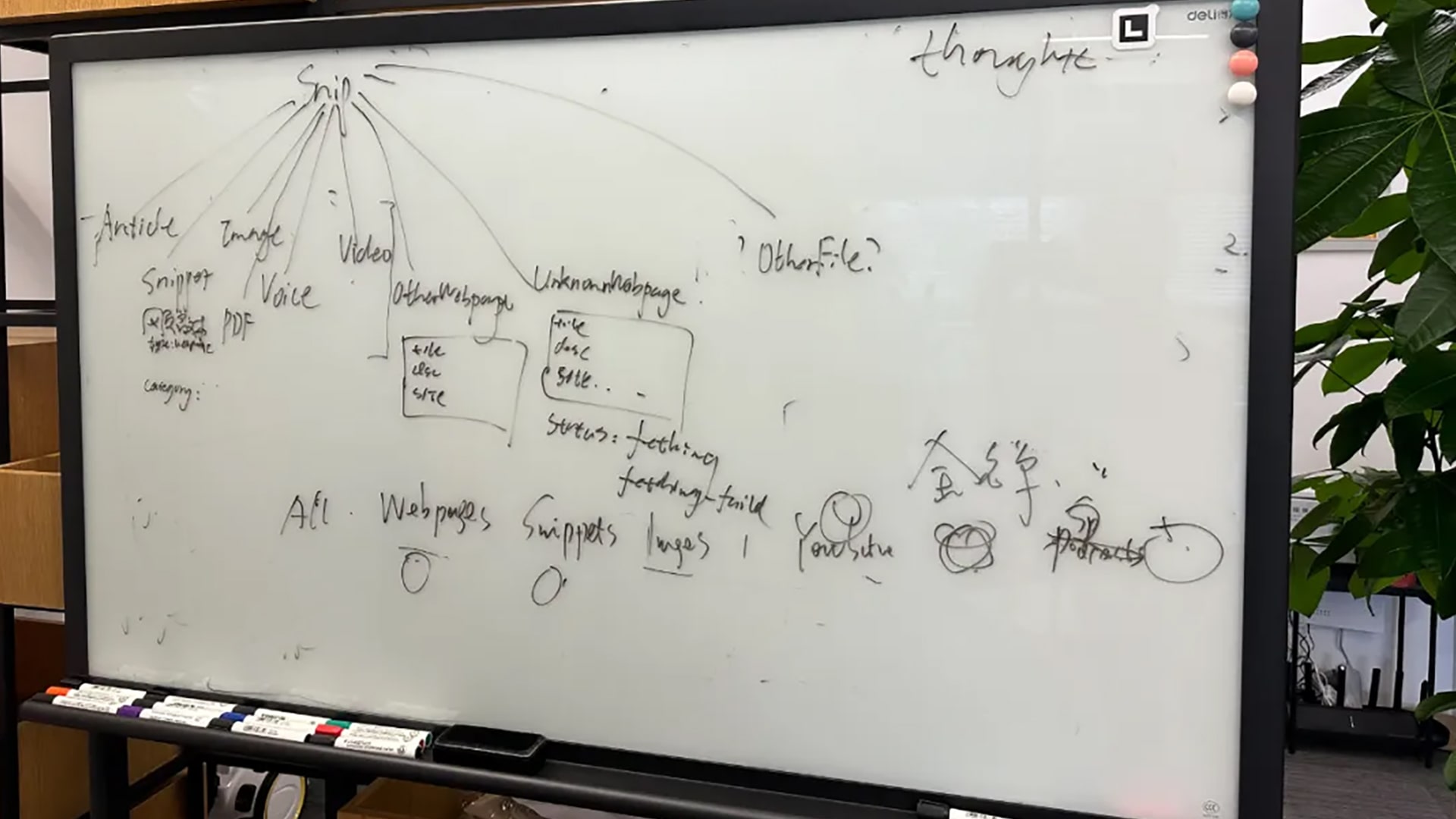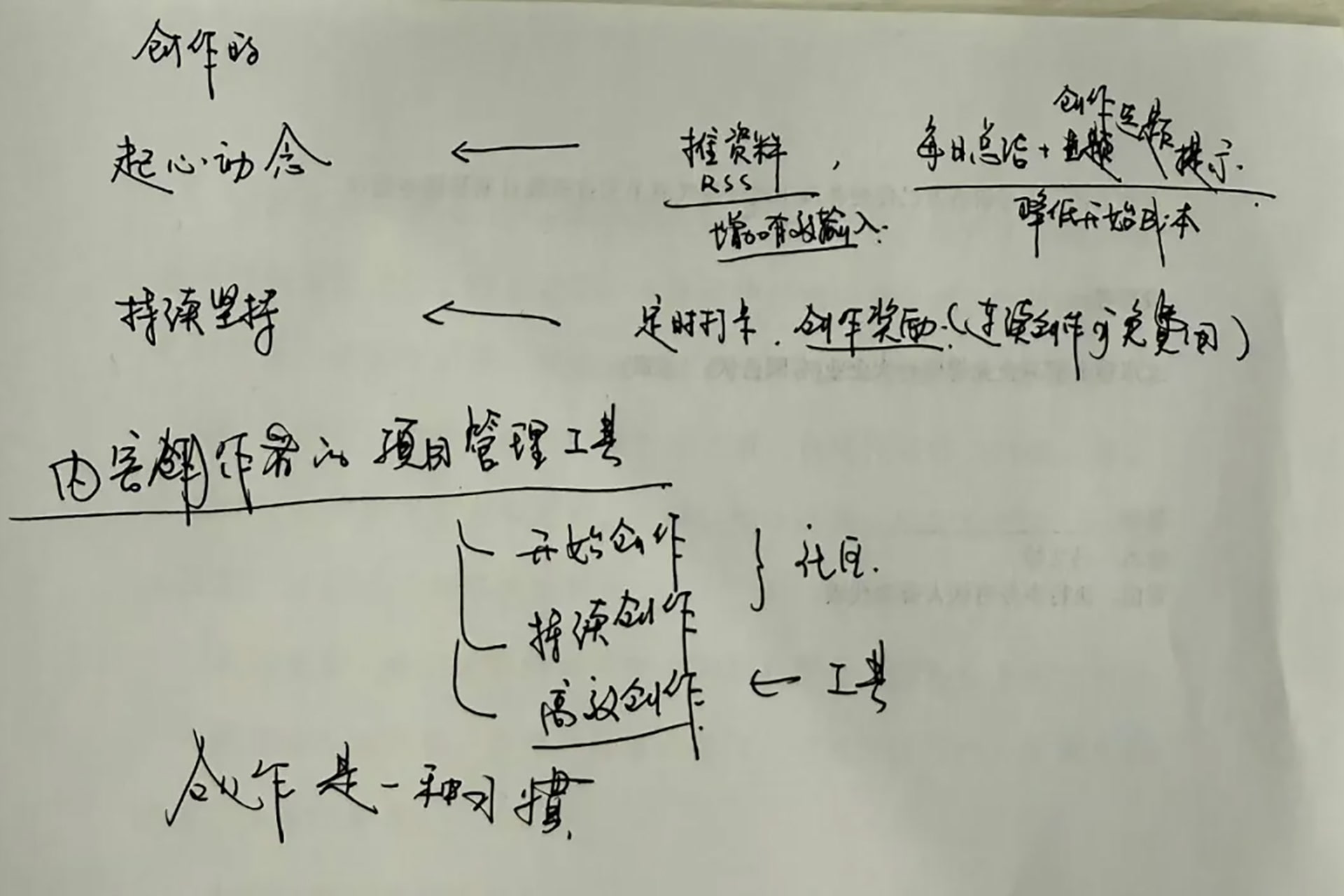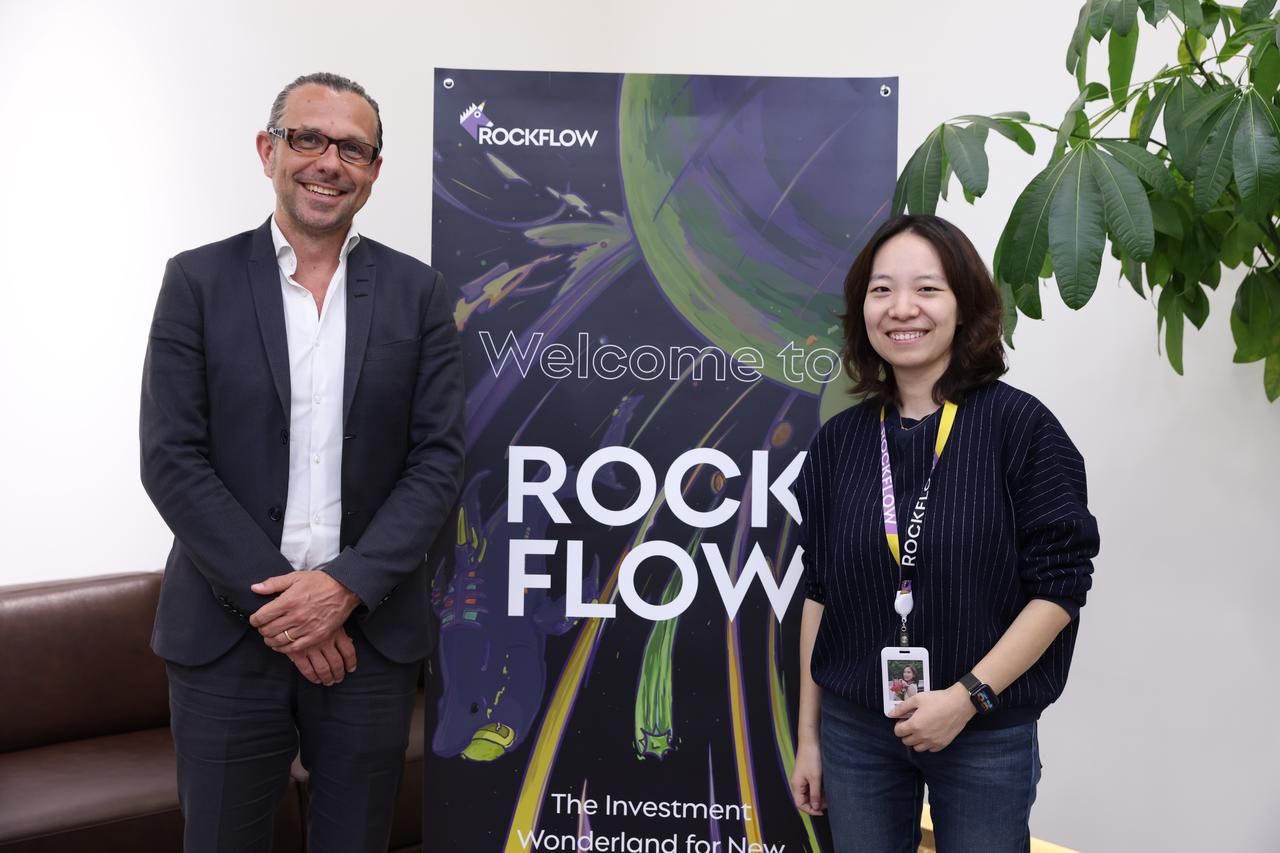100 AI Creators is a weekly series featuring conversations with China’s leading minds in artificial intelligence. As technology evolves, their perspectives shed light on the ideas driving the AI era across borders.
Wang Baoping, better known as Yu Bo, was a senior engineer at Alibaba with a reputation for going against the grain. In keeping with that spirit, his latest project, YouMind, challenges an entire category of digital tools—and the instincts they tend to reinforce.
Most internet apps, Yu argues, play to our worst instincts: distraction, laziness, and greed. With YouMind, he seeks to do the opposite using artificial intelligence, creating a solution that makes everyone a prolific creator.
To be clear, he’s not speaking in abstractions. The product Yu has in mind is meant to tackle real pain points that creators know too well:
- You save dozens of articles for later but find none of them useful when it’s time to write.
- You remember seeing a great idea in a video, but can’t track it down.
- You open a blank document with a vague thought, stare for five minutes, then shut it again.
“This isn’t a people problem. It’s a product problem,” Yu said.
Billed as an “AI creation studio,” YouMind launched in December 2024. Yu likens it to the pen and paper of the AI age: a tool that can carry creators from spark to final draft.

Currently in version 0.2. YouMind lets users store and retrieve articles, videos, podcasts, and more, aiming to be a unified repository and creation hub. A major new version is set to roll out in the second quarter of 2025.
Yu, soft-spoken and always measured in tone, built his reputation as one of Alibaba’s top frontend engineers. But he’s now dismissive of most knowledge tools, calling them solutions to a “fake need.” For him, tools that aren’t built to support actual output are of little value.
He’s also one of the few tech veterans who isn’t chasing scale for its own sake. Investors have pushed him to think bigger, faster. He refuses. He believes YouMind should first be “small but beautiful,” a tool that simply helps a user with a looming deadline get the job done.
Said to scoff at most mobile apps that kill time, Yu believes in a future where more people will create, not just consume. “People who scroll Douyin all day? They’ll become the minority,” he said.
On social media, Yu introduces himself simply as “an honest person.”
In a recent interview, Yu seemed even more resolute than six months ago when he first outlined many of his unconventional beliefs.
“If they don’t get it, it just means their imagination isn’t big enough,” said Yu during the interview.
He left Alibaba in 2023 because of a growing awareness that time was slipping away. “If I didn’t leave now, I’d be too old,” he said.
But for Yu, “time” isn’t about going faster or higher. It’s about whether the next moment can be more meaningful. That belief is also the seed from which YouMind was born.
The following transcript has been edited and consolidated for brevity and clarity.
When meaning matters more
AI Now! (AN): In a previous interview, you said YouMind wants to be the “pen and paper of the AI era.” What does that mean? How does it help users find inspiration?
Yu Bo (YB): Human content creation has gone through three stages.
The first was the print era, when we wrote with pen on paper. The second was the software era, when tools like Office and WPS, plus digital utilities, became our new mediums.
Now we’re in the AI era, version 3.0. “Paper” can’t just be a static surface anymore. It must support video, audio, and other modalities. “Pen” is no longer an object, it’s AI. A partner that helps you generate drafts, polish them, even draw or compose music if needed.
For example, in future versions of YouMind, if a user has saved hundreds of articles, we might ask: “You seem to care about this topic. Why not write something of your own instead of just reading?”
AN: So the goal is to help people create more efficiently?
YB: I don’t like the word “efficiency.” The real aim is quality. We might not shorten your creation process, but we can help elevate what you produce.
I’ve come to think of YouMind as being about time, not space. Most knowledge management tools are about space: storing and organizing. YouMind is focused on what the creator wants to do in the next moment. Can we help move them forward? Can we spark something?
AN: So it’s a “creative companion?”
YB: Exactly. There should be a tool designed around how people experience time, what to write next, how to keep going. We’re not quite there yet, but the direction of evolving from assistant to companion is clear. One that knows your saved material better than you do.
The hardest part is getting started. YouMind wants to help users live more interesting lives. That’s more important than anything else.
AN: You’ve said before that users shouldn’t bother with YouMind unless they are creating something. Isn’t that kind of elitist? Most people don’t even know what they want to write.
YB: It’s true, many people don’t. Even if they have a vague idea and find their first reference, they often hit a wall.
But lately, I’ve started thinking differently. There’s a term I came across on Twitter, from a former OpenAI scientist: “vibe coding.” It refers to how many developers today write one-off scripts, be it quick mini-games or simple sites, just to share with friends. There’s no long-term plan, it’s just fun to make stuff.
So I started wondering: what if we also had “vibe creating?”
You write ten pieces. Maybe one is good enough to share. Or maybe you’re just chatting with a friend and got inspired. You ask AI to draft something. Then tweak it. That kind of low-stakes creation alleviates pressure.

AN: But where’s the motivation? Platforms like Douyin and Xiaohongshu reward users with views and likes.
YB: Great question. I used to wonder the same thing. Then I talked with some folks born after 1995.
A lot of them post videos of their gaming sessions on Bilibili. They will spend hours in Minecraft, building houses for fun. They don’t care if anyone’s watching. They will do it just because it makes them happy.
For those of us born in the 1980s or 1990s, creation often had to be tied to income. But younger generations live in more abundant times. They care more about joy, recognition, and self-expression. Their motivation comes from within, not from money.
AN: What’s a typical use case for YouMind?
YB: Right now, our core users are podcasters and video creators. They need transcripts. They need to clip and save media files. In the past, they would store content in folders but could never find the right file when they needed it. It drove them nuts.
Now they just drop everything into YouMind. It transcribes automatically. If they remember a single word, they can find the exact clip. That solves one of the huge pain points in video search.
Honestly, I didn’t expect this feature to be so popular, but some users pay just for that. That’s the fun of building products.
AN: So you started charging users from day one?
YB: Yes. It filters for serious early adopters.
Disliking the big tech exec label
AN: Let’s talk about your personal journey. You were at Alibaba for 15 years. Why only take the leap into entrepreneurship in 2024?
YB: In April 2023, Alibaba sent me a congratulatory message on my 15th work anniversary. That hit me hard. I thought, if I don’t leave now, I’ll be too old. That night, I sent myself a note: “Leave, now.” It was pure fear driving me.
The real catalyst, though, was ChatGPT. Alibaba is an ops-driven company. As a frontend developer, I rose through the ranks during the mobile internet boom, but I always felt like I was watching someone else’s story unfold. With AI, for the first time, I saw a story I could write myself.
Honestly, after quitting, I realized there weren’t as many opportunities as I’d imagined. It wasn’t until later that year, when I saw GitHub Copilot and Perplexity, that the path finally became clear.
AN: Why those two?
YB: Programming during the PC and mobile eras was deterministic. You controlled everything: inputs, outputs, bugs, and timelines. AI is different. It’s collaborative. The developer becomes more of a coach, using prompts, data, and feedback to shape the AI’s responses.
You can’t fully control outcomes anymore, but the problems AI can solve are far more complex.
Take Douyin’s recommendation algorithm. It delivers personalized content to every user, but the logic behind it is still understandable to engineers. It’s transparent, a so-called “white box.”
But with large language models (LLMs), things work differently. You can’t fully explain how they arrive at their responses. They are a “black box.” That changes everything. Instead of tailoring content for millions of different users, LLMs can tailor a million different responses for just one person.
AN: Why focus on building at the application layer instead of foundational models?
YB: Brutal self-awareness, honestly. I can read AI papers, but I’m not a Tsinghua-trained researcher like Yang Zhilin who began tinkering with foundational models as an undergrad. I’d be deluding myself if I thought I could compete with him.
So I leaned into Steve Jobs’ idea of “connecting the dots.” You build from what you’re already good at. If you’re made for speed, don’t switch tracks to compete in the high jump.
AN: The industry favors “AI-native” founders. What’s your take?
YB: Ironically, AI-native apps are often the most fragile. Strip out the AI, and there’s nothing left.
I want to build a “boat,” something that rises with the tide as foundational models improve.
AN: Do you see yourself as a typical big tech exec?
YB: Not at all. I hate that label. Not all execs are the same. I don’t even respect some so-called “high P” peers—Alibaba’s internal term for senior technical staff. I’ve never fit that mold.
If investors come in with fixed ideas about me, that’s on them. If they still can’t look past my Alibaba title after a couple of conversations, I won’t waste time with them.
AN: What’s the question investors challenge you with most?
YB: There are three big ones:
- What’s the ceiling for YouMind?
- If it’s just a tool today, how does it become a community?
- Why is your team the one to build it?
AN: And how do you answer those?
YB: They’ are really all just different ways of asking: how big can this get?
The truth? I don’t know.
Right now, everyone looks at ARR (annual recurring revenue). But that metric is easily gamed. Some teams take one month’s revenue, multiply it by 12, and declare it ARR. I even saw a company that had launched nine days ago and claimed it hit USD 10 million in ARR.
For me, seven-day user retention is a more honest metric. If you’re at 40% or higher, the product has legs. But no one wants to talk about that because most retention numbers aren’t great.
AN: If your data doesn’t support your vision, how do you convince investors?
YB: Honestly, when someone pokes holes in your idea, that’s valuable.
I genuinely believe more consumers will become creators. We’ll go from 30–50 million creators worldwide to ten times that.
That’s not based on data. It’s conviction.
If an investor shares that belief, great. If not, let’s not waste each other’s time.
Betting on our better nature
AN: You spent years deep in the knowledge management space. Why walk away now to build an AI creation tool?
YB: Because in the AI era, knowledge management might just be a false need. That’ll upset some people, but it’s what I believe.
I used to be a heavy user of notetaking tools. Then I ran a little experiment: I saved the login for one app in a corner of my notes. If I truly needed it, I’d come back. I never did.
AN: But these tools are still booming.
YB: They keep promising a “second brain.” But since ChatGPT, we already have one. Why organize everything manually when a model can retrieve and summarize on demand?
If you’re not creating anything, no amount of saved knowledge means much. That’s why I built YouMind around output. I’ve always believed that content creation is the best form of content consumption.
AN: You talk a lot about “output-driven” design. How does that show up in the product?
YB: We borrow from the “PARA” method: project, area, resource, archive.
- Project: To tie your work to a deadline or goal.
- Area: Topics you’re interested in, even if they aren’t urgent. For me, AI is an area.
- Resource: Everything you save.
- Archive: This one’s crucial. If a project stalls, archive it or delete it. Don’t let things accumulate for no reason.
AN: You’ve said YouMind could be the next YouTube because people will move from passive consumption to active creation. Isn’t that a bit too optimistic? Most people just want to lie in bed and scroll.
YB: I’ve always believed that the next big content platform won’t be another Douyin, but one built for creation.
Because human nature, like everything else, has its polarities. In Buddhist philosophy, it’s yin and yang. For every downward pull, there’s an upward one.
Greed, anger, and delusion make up half of our impulses. But the other half is just as real: discipline, insight, and aspiration.
If that upward side didn’t exist, things like yoga and gyms wouldn’t thrive. But they do.
Mobile internet apps fed our worst instincts. But the AI era should open the door for something different.
AN: So you believe everyone has the potential to be a creator?
YB: Absolutely. Creation will be part of everyday life.
That’s why I’ve always said: if YouMind makes creation easy enough, it won’t just be a tool. It’ll become a community.
AN: But turning a tool into a community is notoriously difficult. What makes YouMind different?
YB: I’ve spent over a decade building open-source projects. Back then, GitHub started as a small tool, then became a suite, then a global community. Eventually, it became a multibillion dollar company.
I know that trajectory well. For YouMind, GitHub is a path worth following.
Quick takes
AN: What surprised you most about AI in 2025?
YB: Until late 2024, I felt the progress on foundational models was slow. I’m building a boat, but when the water doesn’t rise, you just scrape against rocks.
Then DeepSeek launched over the Lunar New Year. Shortly after, OpenAI dropped GPT-o3. Suddenly, AI’s reasoning felt real. It started thinking like a person.
Then Manus launched its agent framework, bringing reasoning, tool usage, and memory together. AI started feeling active, not reactive—the agent era had arrived.
All of that happened in just the first four months of 2025. It has been a total upheaval.
AN: Was there anything you were wrong about?
YB: GPT-4o’s image generation. I used to find diffusion models clunky. Even with fine details, it was easy to tell something was AI-generated.
But when GPT-4o came out, I realized the limitation was my own perspective. Multimodal and fully modal models are going to be a big deal.
AN: What’s overhyped, and what’s underestimated?
YB: In the short term, AI applications are overhyped. But in the long run, they are hugely underestimated.
Right now, most use cases for AI are about boosting productivity. It can probably handle 60% of repetitive tasks. The remaining 40%? Still very human.
Ironically, designers are harder to replace than programmers. Code follows rules. Design is instinct. And instinct is hard to teach a machine.
But here’s the bigger shift: AI has lowered the barrier to starting companies. The hardest part now is picking the right direction. People who love tinkering, especially those who come from traditional industries, might end up leading the next wave.
AN: What are you most looking forward to in 2025?
YB: I hope DeepSeek, OpenAI, and Claude can get to the point where they are like water or electricity: cheap, reliable, and ubiquitous. That would make building new things so much easier.
AN: Recommend three of your favorite books.
YB: “Diamond Sutra.” I didn’t understand it at first, so I hand-copied it a few times. Now, it’s starting to click.
“The Era of Confucius” by Li Shuo. He also wrote “Revelation,” which is about the Shang dynasty.
“The Memoir of Literature” by Mu Xin. The writing is just beautiful.
100 AI Creators is a collaborative project between AI Now! and KrASIA, highlighting trailblazers in AI. Know an AI talent we should feature? Reach out to us.

